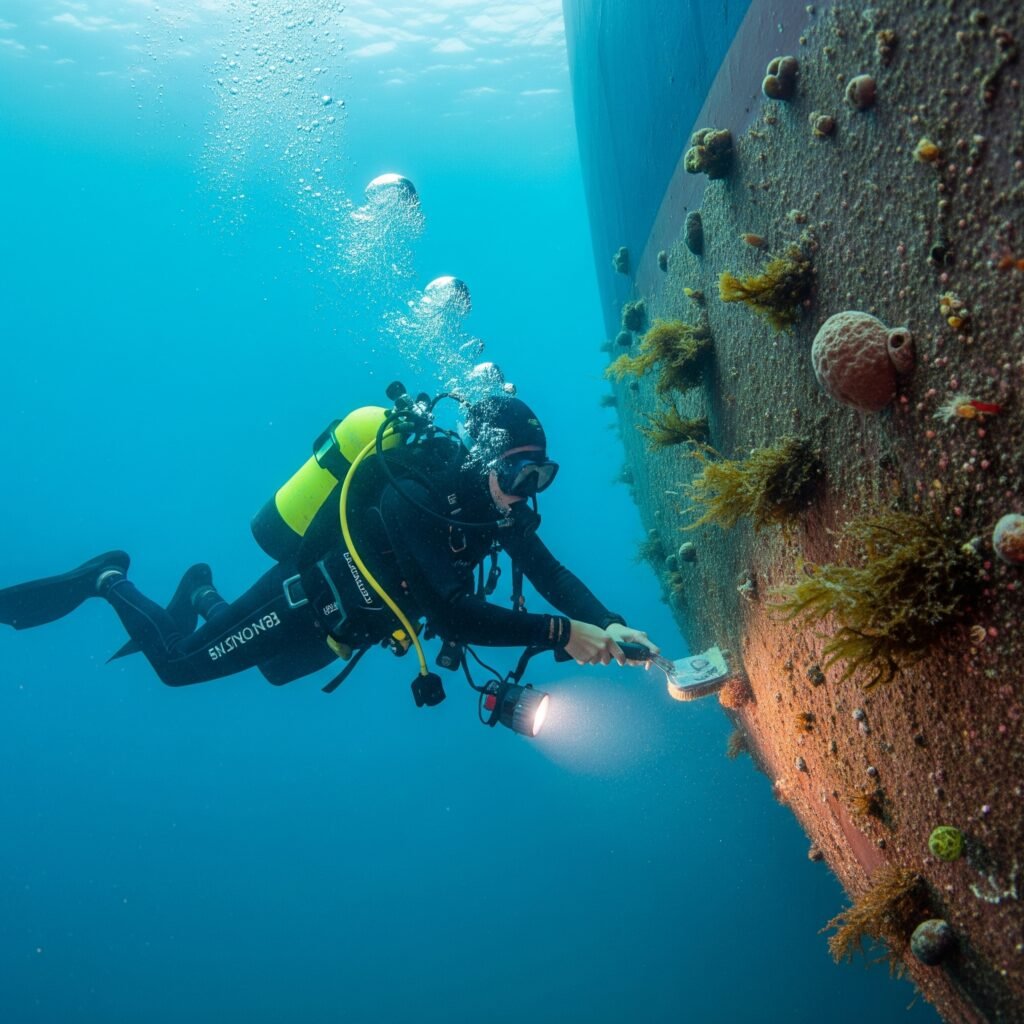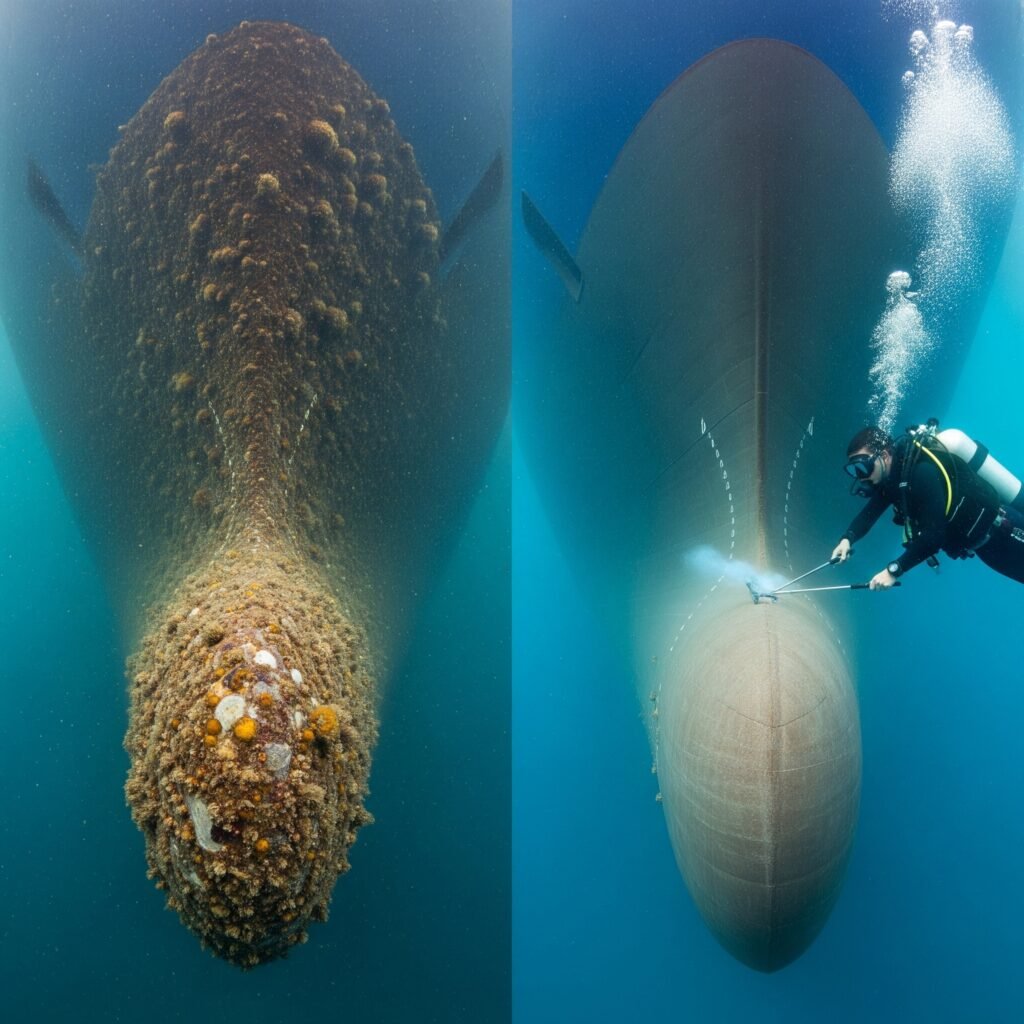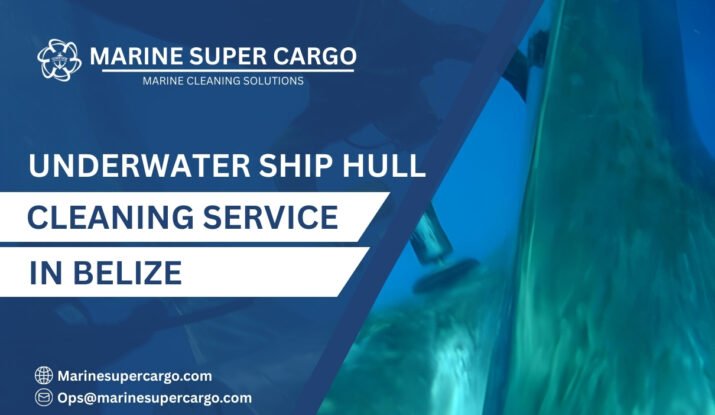Underwater ship hull cleaning in Belize is known for its vibrant coral reefs, thriving marine biodiversity, and crystal-clear Caribbean waters. However, beneath the surface, ship hulls face a persistent and costly challenge—biofouling. This is the accumulation of marine life, such as algae, barnacles, and slime, that clings to the submerged sections of vessels.
In Belize’s warm, nutrient-rich tropical waters, biofouling develops rapidly. Left unchecked, it impacts vessel efficiency, increases fuel use, raises emissions, and can even result in violations of international maritime regulations. For ship operators navigating these waters, effective and environmentally responsible underwater ship hull cleaning in Belize is essential—not only for operational performance but also to protect Belize’s delicate marine ecosystems.
Understanding Biofouling and Its Consequences Underwater Ship Hull Cleaning in Belize
Types of Fouling
- Microfouling – Thin biofilms that form within days, creating a slippery layer on the hull.
- Macrofouling – Larger organisms such as barnacles, mussels, hydroids, and seaweed attach over time.
- Hard Fouling – In tropical waters, corals and bryozoans can attach firmly to the hull, making removal more challenging.

Operational and Environmental Impact
- Drag Increase – Fouling can raise water resistance by up to 30%, decreasing speed and agility.
- Fuel Consumption – Fouled hulls may use 5–15% more fuel, and in tropical conditions, the figure can be higher.
- Higher Emissions – Increased fuel use leads to greater CO₂, NOx, and particulate emissions.
- Coating Damage – Fouling accelerates the breakdown of antifouling paints, leading to more frequent maintenance.
- Invasive Species Risk – Organisms transported from one region to another can disrupt ecosystems, violating International Maritime Organization (IMO) standards.
Why Underwater Ship Hull Cleaning in Belize Requires a Special Approach
Belize’s marine environment is both ecologically rich and heavily protected. Any underwater maintenance must balance effectiveness with strict environmental care.
Limitations of Traditional Diver Cleaning
- Manual scraping can chip or scratch protective coatings, reducing their lifespan.
- Rubber scrapers and abrasive tools can damage antifouling paint.
- Risk of accidentally dislodging coral fragments or accelerating the spread of invasive species.
- Safety hazards for divers, especially in ports with busy vessel traffic or low visibility.
The International Marine Contractors Association highlights these challenges as reasons for the growing shift toward robotic and environmentally responsible hull cleaning solutions.
Advantages of ROV-Based Underwater Ship Hull Cleaning in Belize
Remotely Operated Vehicle (ROV) cleaning is increasingly favored in Belize because it is safer, more precise, and environmentally responsible.
- Low-Pressure Cleaning – Removes fouling without damaging hull coatings.
- Real-Time Monitoring – Cameras record progress and cleanliness for quality assurance.
- Waste Containment – Dislodged organisms are collected immediately via suction and filtration, ensuring zero debris enters the sea.
- No Diver Risk – ROVs operate entirely remotely, improving safety and reducing insurance concerns.
How Underwater Ship Hull Cleaning in Belize is Conducted
A structured approach ensures minimal disruption and maximum effectiveness.
1. Pre-Operation Planning
- Collect vessel data: hull shape, coating type, fouling history, and operational schedule.
- Determine cleaning window: at anchorage or alongside berth.
- Notify port authorities to ensure all regulatory requirements are met.
2. ROV Deployment
- Equipment is prepared at the operation site; no dry-docking is required.
- The ROV is deployed and navigated along the hull in controlled cleaning passes.
- Operators monitor live video feeds to adjust cleaning speed and pressure in real-time.
3. Waste Suction and Filtration
- Fouling is removed and suctioned directly into the ROV’s onboard waste capture system.
- Wastewater passes through multiple filtration stages before storage.
- All waste is disposed of by Belize’s environmental regulations.
4. Post-Cleaning Reporting
- High-definition before-and-after photos and video clips are compiled.
- Analysis includes fouling type, coverage percentage, and performance summary.
- Recommendations are provided for future cleaning schedules and fuel efficiency improvements.
Recommended Underwater Ship Hull Cleaning in Belize Frequency by Vessel Type
Given Belize’s high fouling potential, cleaning intervals are shorter than in temperate waters.
- Commercial Cargo & Bulk Carriers – Every 8–10 weeks, especially when operating in warm, nutrient-rich routes.
- Ferries & Passenger Vessels – Bi-monthly to maintain performance and schedules.
- Idle or Seasonal Vessels – Clean before resuming operations or relocating to different waters to avoid contamination risks.
The International Association of Ports and Harbors emphasizes that proper cleaning schedules help ensure efficiency, compliance, and environmental protection.
Economic and Environmental Advantages of Underwater Ship Hull Cleaning in Belize
1. Fuel Savings
A smooth, clean hull reduces drag, enabling ships to maintain speed with less power. In some cases, this can lead to savings of up to 12% annually—equating to thousands of dollars for medium to large vessels. According to the International Association of Ports and Harbors, such efficiency gains also contribute to lowering emissions and supporting global sustainability goals.
2. Emission Reductions
Lower fuel consumption reduces CO₂ and NOx output, helping operators meet tightening environmental regulations and sustainability targets.
3. Extended Coating Life
Gentle cleaning preserves antifouling coatings, delaying the need for repainting and dry-docking.
4. Competitive Advantage
Eco-conscious operators attract environmentally aware customers, partners, and charterers, strengthening their reputation and marketability. By aligning with green initiatives and adopting sustainable practices—such as those promoted at the Port of Durrës—companies not only meet environmental standards but also gain a competitive edge in an increasingly sustainability-driven maritime market.

Case Example from Belizean Waters
A cargo vessel with 2,000 HP engines operating on regional routes experienced a 20% fuel use increase after five trips due to heavy biofouling.
- Action Taken – A 6-hour ROV cleaning was conducted while anchored near Belize City.
- Method – Waste was fully suctioned and filtered, with 96% of fouling captured for proper disposal.
- Results – Post-analysis revealed 65% fouling coverage before cleaning. The vessel’s efficiency improved immediately, reducing fuel use and voyage times.
Conclusion:
In Belize’s warm, biologically active waters, biofouling can develop rapidly, impacting operational efficiency, increasing costs, and threatening marine ecosystems. Underwater ship hull cleaning in Belize using modern ROV technology offers a safe, efficient, and environmentally responsible solution. By adopting this approach, operators not only enhance vessel performance but also contribute to the long-term protection of Belize’s treasured marine heritage.
FAQ:
Q1. Can cleaning be done while loading or unloading?
Yes, ROV cleaning operates independently, allowing simultaneous cargo or fueling operations.
Q2. Is there a risk to sensors or thrusters?
ROV operators avoid sensitive equipment, targeting only hull surfaces.
Q3. How quickly can cleaning be scheduled?
Typically, within 24 hours, depending on weather and operational constraints.
Q4. Can multiple vessels be serviced?
Yes, fleet scheduling with coordinated logistics is available.
Q5. Is the method applicable outside Belize?
Yes, similar ROV-based systems are used in major ports worldwide.


